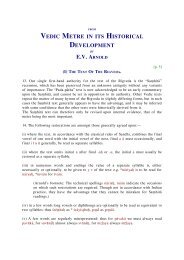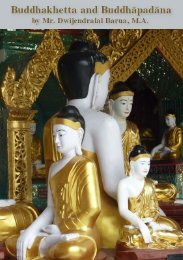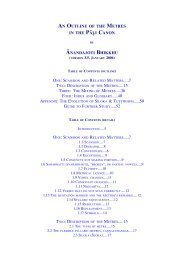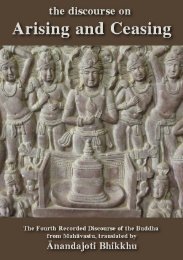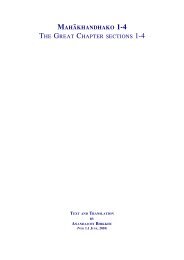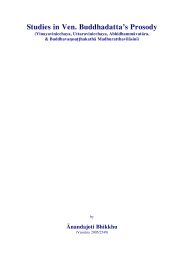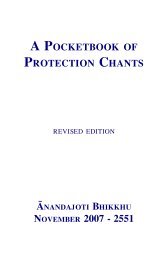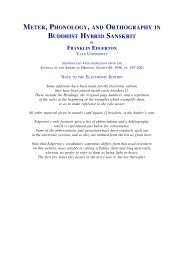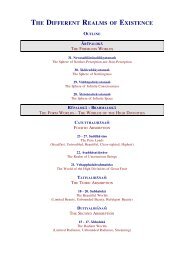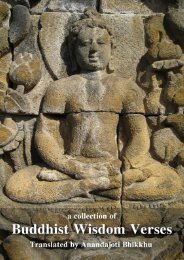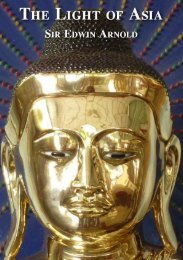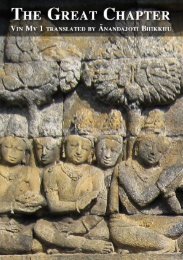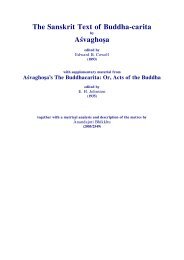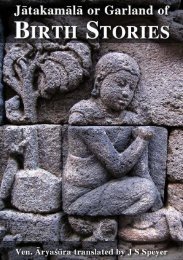Pubbakammapilotika-BuddhÄpadÄnaá¹ - buddhanet
Pubbakammapilotika-BuddhÄpadÄnaá¹ - buddhanet
Pubbakammapilotika-BuddhÄpadÄnaá¹ - buddhanet
You also want an ePaper? Increase the reach of your titles
YUMPU automatically turns print PDFs into web optimized ePapers that Google loves.
Introduction<br />
3. Relationship with Other Traditions<br />
The compound used to describe the verses, kammapilotika (or in some editions kammapiloti)<br />
doesn't occur anywhere else in the Pāḷi texts except in connection with these verses; however, it<br />
does occur in Buddhist Sanskrit works 10 like Divyāvadāna, 11 Avadānaśataka and<br />
Laṅkāvatārasūtra; and there are parallels to the text in the Mūlasarvāstivāda<br />
Anavataptagāthā, 12 and in Gandhārī. 13<br />
What is more, one of the stories is told, in even more detail in the Mahāvastu. 14 In the verses<br />
here it only says that through slandering a disciple of the Buddha Sabbābhibhu called Nanda,<br />
the (unnamed) Buddha-to-be transmigrated through hell for a long time, and in his last<br />
existence was slandered in turn by the maiden Ciñcā; and as noted above the commentary<br />
doesn't provide an appropriate story here.<br />
The Mahāvastu, however, has a long story about a monk called Abhiya who, being of a jealous<br />
nature, slandered the disciple called Nanda accusing him of sexual relations with a wife of a<br />
rich merchant. The interesting conclusion has Abhiya realising his fault, asking forgiveness<br />
from Nanda, and confessing his wrong-doing to the Buddha. He then makes an offering to the<br />
Buddha and makes an aspiration to become a Buddha himself, which is confirmed by Buddha<br />
Sarvābhibhū.<br />
The idea of the connection of past deeds was also known to the Upāyakausalya also, 15 where it<br />
is said the Buddha only told these stories as part of his skill-in-means, but not because he<br />
actually ever did anything wrong, which the text categorically denies he could have done,<br />
which represents another view on the subject altogether.<br />
It is not within the scope of this introduction to examine all these continuities and<br />
discontinuities, but one thing is clear: the idea that the Buddha-to-be had done unwholesome<br />
deeds that came to fruition in the Buddha's lifetime was clearly known to the early traditions,<br />
even when it was rejected.<br />
4. The Bodhisatta's Bad Deeds<br />
That the Buddha-to-be should have done bad deeds should not surprise us, as it is recorded<br />
openly in the Jātaka stories that the Buddha-to-be many times did bad, unwholesome deeds. He<br />
is, of course, still pursuing the perfections, and has no claim to having completed them as yet,<br />
and so is bound to make misjudgements like everybody else.<br />
For instance, in Jā 128 the Buddha-to-be is reborn as a rat and springs at a jackal's throat and<br />
kills him; in Jā 318 he is born in a robber's family and practices his craft; in Jā 431 he engages<br />
in sexual misconduct with a queen – interestingly in the same Jātaka, though, it denies that the<br />
Buddha-to-be can tell lies:<br />
10 There the compounds are karmaplotika and karmaploti.<br />
11 Cf. Divyāvadāna p. 150, where one of the 10 indispensable deeds (daśāvaśyakaraṇīyāni) is listed as:<br />
Anavatapte mahāsarasi śrāvakaiḥ sārdhaṁ ; explaining the<br />
connection with former deeds with his disciples near the great lake Anavatapta (Anotatta in Pāḷi).<br />
12 See Bechert, Die Anavataptagāthā und die Sthaviragāthā, Berlin 1961.<br />
13 See http://gandhari.org/a_manuscript.php?catid=CKM0001.<br />
14 See Senart's edition: pg. 34-45. I hope to translate this text at some point.<br />
15 But there the compound is karmasantati, and the list is not twelve items, but ten. Most of them are the<br />
same as is recorded here, however, so that it is clear we are dealing with the same tradition.<br />
6



